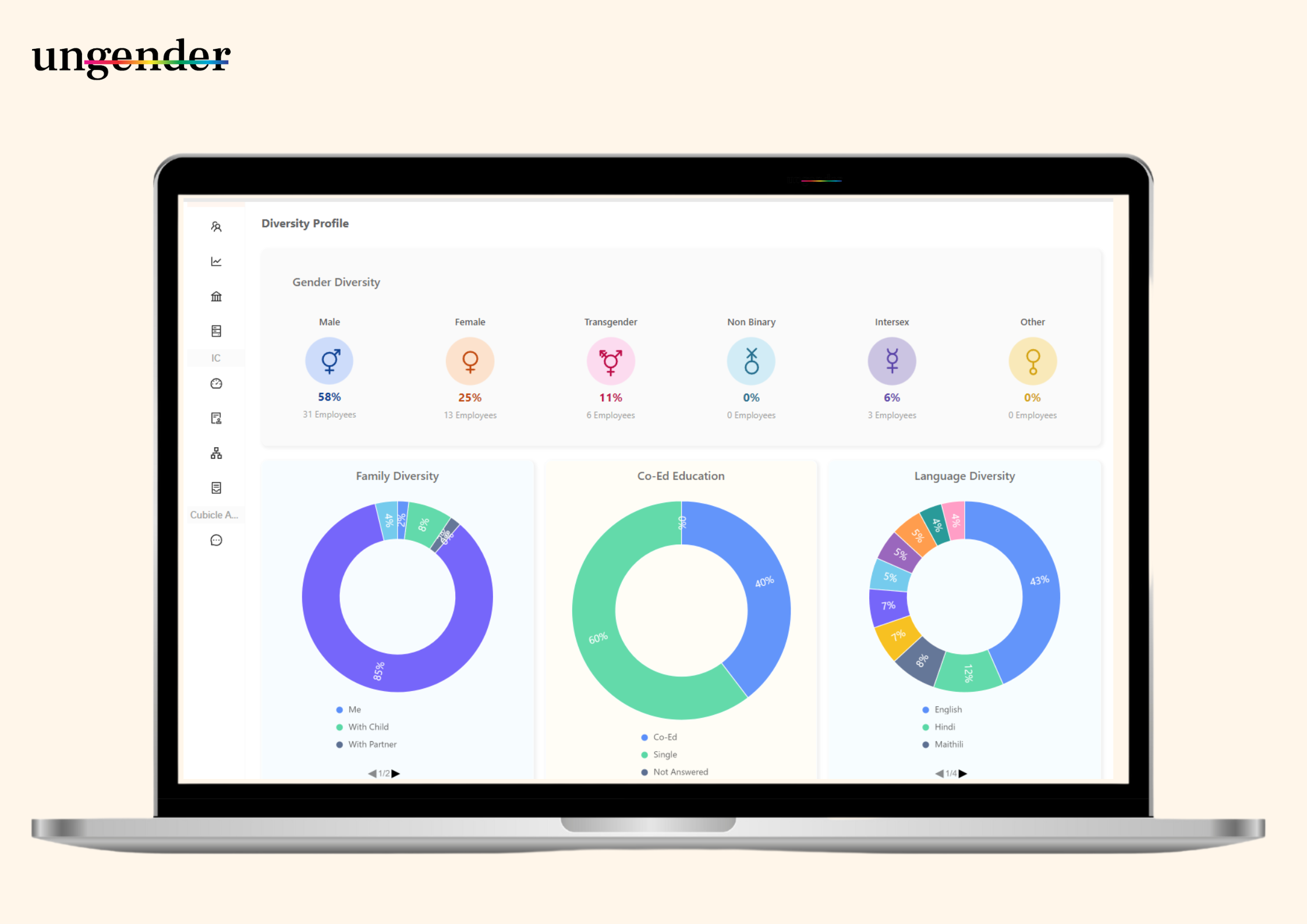A DEIB strategy is the way to go for organizations in this interconnected and interdependent world of humans. By implementing DEIB, organizations will not only foster an inclusive culture that will lead to employee retention and satisfaction but also contribute to overall organizational growth.
Diversity, inclusivity, and belonging are part of the same pod. However, equity does the work of uplifting them. Let’s understand them a little:
Diversity
It refers to people from different sects, backgrounds, communities, and groups. Diversity contains a wide range of characteristics and attributes that make individuals unique. Some examples of diversity can be ethnicity and race, gender identity and expression, sexual orientation, physical and mental abilities, etc.
Inclusion
Creating an inclusive organization involves fostering an environment where all individuals feel empowered to contribute their best. Some examples of inclusivity can be diverse hiring practices, using inclusive language, unbiased performance evaluation, etc.
Equity
It ensures equal access to opportunities and the same treatment for all. The purpose of equity is to eradicate barriers and achieve full participation of all people. Some examples of equity-focused initiatives are equal pay, equal access to opportunities, transparency and accountability, flexible work policies, etc.
Belonging
It refers to feeling a sense of camaraderie in a work environment. Every employee should feel that their views and opinions are valued and respected. Some examples could be the recognition of unique work between peers, frequent meetups between the employer and employees, etc.

Get in touch with us to implement an effective DEIB strategy in your workplace
Benefits of a DEIB strategy in the organization
Humans thrive in a work environment where they feel understood, respected, and valued. DEIB is a strategic process that drives organizational success in today’s complex world by nurturing and uplifting employees. By embracing DEIB, organizations unlock a multitude of benefits, ranging from increased innovation and creativity to improved problem-solving, broader market appeal, and enhanced employee engagement and retention. As we move forward, organizations that champion DEIB will stand as pioneers, shaping a more inclusive, equitable, and harmonious future for all.
Challenges while implementing a DEIB strategy
DEIB strategy has become essential for businesses aiming to create a workforce that reflects the society it serves and to ensure equal opportunities for all employees. However, the journey toward implementing a successful DEIB strategy is not without its challenges. Let’s understand what challenges you might face on your journey to implement DEIB in your workplace:
1. Resistance to change
One of the foremost challenges in implementing a DEIB strategy is resistance to change. Not everyone in an organization may understand the need for these initiatives, or some might be apprehensive about their potential impact. Overcoming this resistance requires effective communication and education.
Akshay CM, DEI & Talent Management Consultant, says:
“When it comes to challenges in implementing DEIB, organizations tend to encounter resistance from employees who are resistant to change, difficulties in establishing inclusive policies, lack of leadership buy-in, and the need for continuous education and training. Overcoming these hurdles requires a strategic and committed approach especially from the leadership, because the incentive to bring organisational transformation trickles down from the top. “
2. Lack of leadership commitment
For a DEIB strategy to be successful, leadership commitment is crucial. To address this challenge, organizations need to have leaders who actively champion DEIB and lead by example. Establishing diversity goals and holding leaders accountable for progress can demonstrate the organization’s commitment to change.
3. Unconscious bias
Unconscious biases can unknowingly influence decision-making processes, from hiring to promotions. Addressing unconscious bias requires ongoing training programs that raise awareness and provide tools to recognize and mitigate biases.
5. Inclusive culture development
Creating an inclusive culture where all employees feel valued and heard is a huge challenge for organizations. It requires ongoing efforts to ensure that diverse voices are included in decision-making processes and that employees from all backgrounds feel comfortable expressing themselves.
6. Measuring accountability
Establishing accountability at all levels is important for the implementation of a DEIB strategy. Measuring the effectiveness of DEIB initiatives is essential to understand what’s working and where improvements are needed. This data-driven approach helps ensure accountability and informs adjustments to strategies.
Also read: Why is DEI a business imperative?
Steps to execute a DEIB strategy
More than forming a DEIB strategy it is important to practice them actively. Implementing DEIB is going to require a well-structured plan for any organization. Here are some steps via which you can use also execute effective DEIB strategies:
1. Cultural assessment of the organization
You need to begin with understanding the current state of diversity, equity, and inclusivity in the organization. This includes collecting data, identifying gaps and areas of improvement. Once it has been identified and analyzed then the next task is to define the goals.
With our DEIB & Culture Management System, you will be able to measure your team’s diversity across more than 10 metrics including gender, age, experience, family, and education. This will help you develop a targeted DEIB strategy that is specific to your organizational needs.
2. Define your DEIB goals
It is important to define your DEIB goals. A set standard is going to make it easier to achieve organizational goals. But while defining goals it is important to remember that no one policy fits all. Each employee comes from a different background, upbringing, and experience and to cater to it your policies need to be flexible.
3. Education and Training
Merely talking about DEIB is not going to bring change in the mindsets. For the successful implementation of DEIB, it is important to educate and train the members of your organization. Conduct workshops, seminars, and training sessions to create awareness, address unconscious biases, and promote cultural competence.
4. Inclusive Policies and Practices
Revisit and amend your organization’s policies to align them with your DEIB goals. From recruitment and hiring to promotion and performance evaluations, every process should reflect a commitment to fairness and inclusion. Encourage diverse hiring panels to prevent biased decision-making.
Also read: How can companies ensure inclusive hiring and promotion?
5. Diverse Recruitment
Actively recruit candidates from varied backgrounds to create a pool of qualified and diverse candidates. You can practice inclusive hiring as it will help you in outperforming your competitors. This will also be a good representation of your policies and have a positive impact on your image.
6. Data-driven Approach
Continuous data collection and monitoring will help you analyze the impact of your approach within the organization. You will be able to identify any gaps early on so that adjustments can be made accordingly. Ultimately, keeping up with data will help you make informed and educated decisions for your organization’s growth.
7. Diverse management and leadership
DEI should be the core of any organization’s culture. Diverse and inclusive management is vital for the success of DEI. Equip senior management and leadership with the skills to manage diverse teams effectively and sensitively to create an inclusive environment. Diverse management is a representation of an organization’s commitment to a DEIB strategy.
Conclusion
The implementation of diversity, equity, inclusion, and belonging initiatives in organizations yields multiple benefits that extend far beyond moral imperatives. A DEIB strategy are a commitment to creating a workplace that respects and embraces differences, promotes equal opportunities, and cultivates an environment where every individual’s unique contributions are acknowledged and celebrated. The transformative power of DEIB makes the way for a more vibrant, dynamic, and successful organization that reflects the diverse world in which we live.
How can Ungender help you?
At Ungender, our experienced team offers customized solutions tailored to your specific needs, supporting you in developing and implementing comprehensive a DEIB strategy. We provide training, education, and ongoing guidance to ensure that your organization embraces diversity, fosters inclusion, and reaps the numerous benefits that DEI brings. To create a workplace where every individual feels valued, respected, and empowered, get in touch with us.
FAQs
1. What are DEIB principles?
The key principles are treating people with respect, valuing and celebrating the differences and diversity of people.
2. How do you promote DEIB in the workplace?
Through diverse recruitment and promotion, respecting the differences, making them feel a part of the family, etc.
3. Why is DEIB important?
Humans thrive in a work environment where they feel understood, respected, and valued. DEIB is a strategic process that drives organizational success in today’s complex world by nurturing and uplifting employees.
4. What is the goal of DEIB?
It is a commitment to creating a workplace that respects and embraces differences and promotes equal opportunities
5. What is the difference between inclusion and belonging?
Belonging is the consequence of inclusive actions on the part of the organizations. Belonging is a feeling whereas inclusion is behavior.
Written by: Aarshi Katiyar










